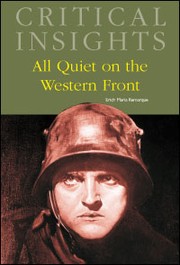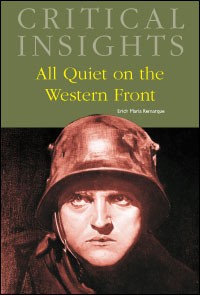Check nearby libraries
Buy this book

"Finally, the truth about war," reviewers proclaimed when All Quiet on the Western Front was published in 1928, ten years after World War I had ended. Shockingly direct, it painted a decidedly unromantic portrait of the war in which Remarque had briefly fought and quickly became an international sensation. Around the world, readers who were still trying to comprehend the war and the devastation it had wreaked across the land, society, and culture of Western Europe found an answer in Western Front. And today, even after eighty years and after tens of millions of soldiers have died in wars, readers keep turning to the novel for answers. Edited and with an introduction by Brian Murdoch, Professor Emeritus of German at the University of Stirling in Scotland, this volume in the Critical Insights series brings together a wide variety of introductory and in-depth essays on Remarque's classic war novel. Murdoch's introduction examines the novel's often overlooked subtleties of tone, characterization, and plot, and Ruth Franklin, writing on behalf of The Paris Review, reflects on Remarque's startling direct style and his relevance to twenty-first-century readers. For those encountering All Quiet on the Western Front for the first time, a quartet of new introductory essays provide a framework for building a deeper understanding of the novel. Thomas Schneider situates it within the culture and politics of Weimar Germany as well as early twentieth-century German war literature, and Mark Ward offers a comprehensive survey of the novel's popular and critical reception. Peter Hutchinson analyzes the intricacies of Remarque's style and structuring, and Matthew J. Bolton compares All Quiet on the Western Front with another iconic novel of World War I, Ernest Hemingway's A Farewell to Arms. Next, a collection of classic and contemporary essays dive into the novel's key contexts and themes. A 1929 correspondence between Remarque and a British general illuminates, in Remarque's own words, his intentions in writing the novel. An excerpt from Hilton Tims's recent biography of Remarque offers an account of the German public's sensational response to All Quiet on the Western Front. Alan F. Bance, too, takes up the public response to the novel, pinpointing various facets that could simultaneously appeal to some readers and alienate or enrage others. Modris Eksteins in turn contextualizes the novel within the international postwar culture, particularly against the war literature of the "lost generation." Offering close readings of All Quiet on the Western Front are Harley U. Taylor, Jr., Richard Arthur Firda, Richard Schumaker, Richard Littlejohns, and Brian Murdoch. Taylor and Firda both consider how Remarque, who spent only a few short months on the western front, succeeded in rendering such a truthful account of trench warfare. Schumaker examines Remarque's expert handling of perspective and time, and Littlejohns uncovers the novel's greatest theme-the devastating effects of wars on those who fight them and those who live through them. Murdoch examines the theme of comradeship in both Western Front and its sequel, The Road Back. Next, a selection of comparative pieces place the novel beside German war literature and the literature of the Weimar Republic. Ann P. Linder considers All Quiet on the Western Front's place within the body of German war literature, and Kim Allen Scott compares Western Front with the war memoir of Rudolf Georg Binding, who was later a Nazi sympathizer. Finally, John Whiteclay Chambers II offers an account of the production and reception of Lewis Milestone's 1930 film adaptation of the novel, and Kathleen Norrie and Malcolm Read compare Milestone's film with another antiwar film of the period, Westfront 1918. Rounding out the volume are an introductory biography of Remarque, a chronology of this life, a list of his major works, and a bibliography of resources valuable for those wishing to explore this classic war novel in greater depth. - Publisher.
Check nearby libraries
Buy this book

Previews available in: English
Showing 1 featured edition. View all 1 editions?
| Edition | Availability |
|---|---|
|
1
All quiet on the western front: Critical insights
2010, Salem Press
in English
1587657198 9781587657191
|
aaaa
Libraries near you:
WorldCat
|
Book Details
Published in
Pasadena, Calif.
Table of Contents
Classifications
The Physical Object
ID Numbers
Community Reviews (0)
Feedback?| February 26, 2022 | Edited by ImportBot | import existing book |
| November 13, 2020 | Edited by MARC Bot | import existing book |
| February 28, 2020 | Edited by MARC Bot | remove fake subjects |
| July 14, 2017 | Edited by Mek | adding subject: Internet Archive Wishlist |
| December 20, 2010 | Created by 158.158.240.230 | Added new book. |









